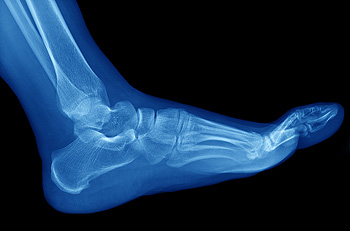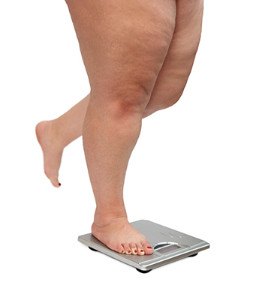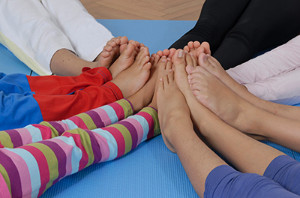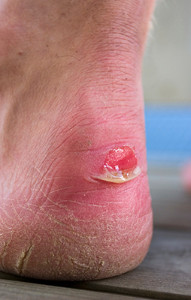Items filtered by date: November 2017
How do Stress Fractures Happen?
 Stress fractures develop when a bone that’s constantly under stress eventually weakens. It typically occurs on the outside of the bone and happens due to repetitive motion. Many professional athletes and runners develop this condition, as overuse of the bones in the foot is common. The way the foot is structured may be another cause, as having flat feet or higher arches may be a contributing factor in developing stress fractures. When overdoing a specific activity, the risk is high for developing these fractures. There may not be physical signs and symptoms from the fracture, but when the activity resumes, pain is often felt. An x-ray is used to determine exactly where the fracture is. Recovery comes from resting the foot and being careful not to put stress on the bones. Occasionally a medical boot is worn to keep the fracture from worsening, in addition to engaging in physical therapy. Please seek the advice of a podiatrist if you feel you have a stress fracture in the foot or ankle.
Stress fractures develop when a bone that’s constantly under stress eventually weakens. It typically occurs on the outside of the bone and happens due to repetitive motion. Many professional athletes and runners develop this condition, as overuse of the bones in the foot is common. The way the foot is structured may be another cause, as having flat feet or higher arches may be a contributing factor in developing stress fractures. When overdoing a specific activity, the risk is high for developing these fractures. There may not be physical signs and symptoms from the fracture, but when the activity resumes, pain is often felt. An x-ray is used to determine exactly where the fracture is. Recovery comes from resting the foot and being careful not to put stress on the bones. Occasionally a medical boot is worn to keep the fracture from worsening, in addition to engaging in physical therapy. Please seek the advice of a podiatrist if you feel you have a stress fracture in the foot or ankle.
Activities where too much pressure is put on the feet can cause stress fractures. To learn more, contact Dr. Ronald Sheppard from Warren-Watchung Podiatry Center. Our doctor can provide the care you need to keep your pain free and on your feet.
Dealing with Stress Fractures of the Foot and Ankle
Stress fractures occur in the foot and ankle when muscles in these areas weaken from too much or too little use. The feet and ankles then lose support when walking or running from the impact of the ground. Since there is no protection, the bones receive the full impact of each step. Stress on the feet can cause cracks to form in the bones, thus creating stress fractures.
What Are Stress Fractures?
Stress fractures occur frequently in individuals whose daily activities cause great impact on the feet and ankles. Stress factors are most common among:
- Runners
- People affected with Osteoporosis
- Tennis or basketball players
- Gymnasts
- High impact workouts
Symptoms
Pain from the fractures occur in the area of the fractures and can be constant or intermittent. It will often cause sharp or dull pain with swelling and tenderness. Engaging in any kind of activity which involves high impact will aggravate pain.
If you have any questions please feel free to contact one of our offices located in Marlboro and Watchung, NJ . We offer the newest diagnostic and treatment technologies for all your foot and ankle needs.
Foot Conditions and Obesity
 Experiencing pain and swelling in the feet are some of the biggest side effects of being obese. These symptoms occur because the body tries to move differently to compensate for the added weight. Being overweight as an adult can result in type 2 diabetes. Diabetes can be a serious condition for many reasons, one of which is neuropathy. This disease can cause feeling to be lost in the feet and legs. Being overweight may also lead to sores on the feet, which may not properly heal. Plantar fasciitis and foot pain can also occur since more pressure is put on the joints, ligaments, tendons, and muscles from being overweight. Special footwear and orthotics may help to keep the feet properly aligned and supported. Make sure to see a podiatrist if you believe you are having any type of foot or ankle issue.
Experiencing pain and swelling in the feet are some of the biggest side effects of being obese. These symptoms occur because the body tries to move differently to compensate for the added weight. Being overweight as an adult can result in type 2 diabetes. Diabetes can be a serious condition for many reasons, one of which is neuropathy. This disease can cause feeling to be lost in the feet and legs. Being overweight may also lead to sores on the feet, which may not properly heal. Plantar fasciitis and foot pain can also occur since more pressure is put on the joints, ligaments, tendons, and muscles from being overweight. Special footwear and orthotics may help to keep the feet properly aligned and supported. Make sure to see a podiatrist if you believe you are having any type of foot or ankle issue.
Obesity has become very problematic at this point in time and can have extremely negative effects on the feet. If you’re an obese individual and are concerned about your feet, contact Dr. Ronald Sheppard from Warren-Watchung Podiatry Center. Our doctor can provide the care you need to keep you pain-free and on your feet.
Obesity and Your Feet
Since your feet are what support your entire weight when standing, any additional weight can result in pain and swelling. Being overweight is one of the main contributors to foot complications.
Problems & Complications
Extra Weight – Even putting on just a few extra pounds could create serious complications for your feet. As your weight increases, your balance and body will shift, creating new stresses on your feet. This uneven weight distribution can cause pain, even while doing the simplest tasks, such as walking.
Diabetes – People who are overweight are at serious risk of developing type-2 diabetes, which has a drastic impact on the health of your feet. As you get older, your diabetes might worsen, which could lead to loss of feeling in your feet, sores, and bruises. You could also become more prone to various infections.
Plantar fasciitis – Pressure and stress that is placed on muscles, joints, and tendons can trigger plantar fasciitis, which is an inflammation of tissue that forms along the bottom of the foot.
If you have any questions please feel free to contact one of our offices located in Marlboro and Watchung, NJ . We offer the newest diagnostic and treatment technologies for all your foot and ankle needs.
Many Children Wear Shoes that are the Wrong Size
 Buying the right size shoes for children can be a tough but important task. Unlike adults, children’s feet are still developing and require adequate shoe space so that their feet aren't constricted. A recent survey of 2000 parents found that many children wear shoes that are the wrong size. Shoes that are too small can cause foot conditions like hammertoes and exacerbate bunions. Shoes that are too big can make trips and falls more likely. With this in mind when shopping for shoes, have your children’s feet measured properly by a store clerk or with a foot measuring device. If one foot is slightly larger than the other, go with the larger foot size. Make sure that your children have enough toe space and that the shoe isn’t too tight. Finally, children’s feet are constantly growing, so make sure to measure their feet every time you go shoe shopping.
Buying the right size shoes for children can be a tough but important task. Unlike adults, children’s feet are still developing and require adequate shoe space so that their feet aren't constricted. A recent survey of 2000 parents found that many children wear shoes that are the wrong size. Shoes that are too small can cause foot conditions like hammertoes and exacerbate bunions. Shoes that are too big can make trips and falls more likely. With this in mind when shopping for shoes, have your children’s feet measured properly by a store clerk or with a foot measuring device. If one foot is slightly larger than the other, go with the larger foot size. Make sure that your children have enough toe space and that the shoe isn’t too tight. Finally, children’s feet are constantly growing, so make sure to measure their feet every time you go shoe shopping.
Making sure that your children maintain good foot health is very important as they grow. If you have any questions, contact Dr. Ronald Sheppard of Warren-Watchung Podiatry Center. Our doctor can provide the care you need to keep you pain-free and on your feet.
Keeping Children's Feet Healthy
Having healthy feet during childhood can help prevent medical problems later in life, namely in the back and legs. As children grow, their feet require different types of care. Here are some things to consider...
Although babies do not walk yet, it is still very important to take care of their feet.
Avoid putting tight shoes or socks on his or her feet.
Allow the baby to stretch and kick his or her feet to feel comfortable.
As a toddler, kids are now on the move and begin to develop differently. At this age, toddlers are getting a feel for walking, so don’t be alarmed if your toddler is unsteady or ‘walks funny’.
As your child gets older, it is important to teach them how to take care of their feet.
Show them proper hygiene to prevent infections such as fungus.
Be watchful for any pain or injury.
Have all injuries checked by a doctor as soon as possible.
Comfortable, protective shoes should always be worn, especially at play.
If you have any questions please feel free to contact one of our offices located in Marlboro and Watchung, NJ . We offer the newest diagnostic and treatment technologies for all your foot and ankle needs.
Preventing Blisters on the Feet When Hiking
 Blisters are no fun, especially when you’re hiking and they develop on the feet. Fortunately, there are some simple steps you can take to help prevent them in the first place. Make sure your shoes properly fit and provide cushioning, support, and toe space. If you know of areas where you are likely to get blisters, such as on the back of the heel, cover these spots with medical tape or bandages. Doubling up on socks, or wearing liner socks under your regular socks, can help prevent friction, which is the cause of blisters. Furthermore, changing your socks daily is necessary to help prevent moisture buildup and keep them dry; this is especially true if your feet get wet. When you are finished hiking for the day, take your shoes and socks off to let your feet air out.
Blisters are no fun, especially when you’re hiking and they develop on the feet. Fortunately, there are some simple steps you can take to help prevent them in the first place. Make sure your shoes properly fit and provide cushioning, support, and toe space. If you know of areas where you are likely to get blisters, such as on the back of the heel, cover these spots with medical tape or bandages. Doubling up on socks, or wearing liner socks under your regular socks, can help prevent friction, which is the cause of blisters. Furthermore, changing your socks daily is necessary to help prevent moisture buildup and keep them dry; this is especially true if your feet get wet. When you are finished hiking for the day, take your shoes and socks off to let your feet air out.
Blisters are prone to making everyday activities extremely uncomfortable. If your feet are hurting, contact Dr. Ronald Sheppard of Warren-Watchung Podiatry Center. Our doctor can provide the care you need to keep you pain-free and on your feet.
Foot Blisters
Foot blisters develop as a result of constantly wearing tight or ill-fitting footwear. This happens due to the constant rubbing from the shoe, which can often lead to pain.
What Are Foot Blisters?
A foot blister is a small fluid-filled pocket that forms on the upper-most layer of the skin. Blisters are filled with clear fluid and can lead to blood drainage or pus if the area becomes infected.
How Do Blisters Form?
Blisters on the feet are often the result of constant friction of skin and material, usually by shoe rubbing. Walking in sandals, boots, or shoes that don’t fit properly for long periods of time can result in a blister. Having consistent foot moisture and humidity can easily lead to blister formation.
Prevention & Treatment
It is important to properly care for the affected area in order to prevent infection and ease the pain. Do not lance the blister and use a Band-Aid to provide pain relief. Also, be sure to keep your feet dry and wear proper fitting shoes. If you see blood or pus in a blister, seek assistance from a podiatrist.
If you have any questions, please feel free to contact one of our offices located in Marlboro and Watchung, NJ . We offer the newest diagnostic and treatment technologies for all your foot care needs.
